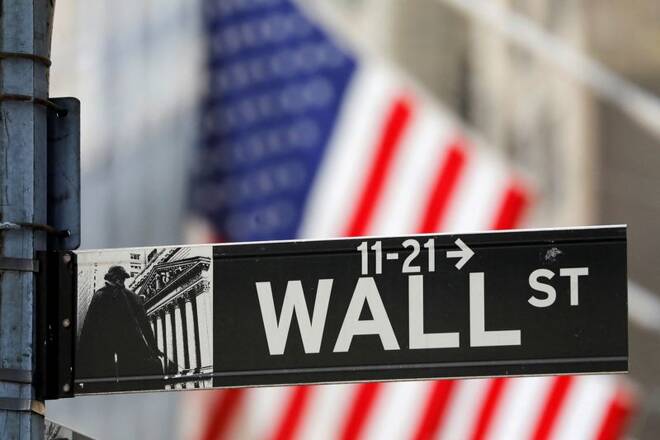Advertisement
Advertisement
Take Five: Welcome to 2023
By:
LONDON (Reuters) - A potential shift by the world's most dovish major central bank, inflation pressures abating, a turn in the economic outlook and oil markets suffering their biggest tumble in decades: Welcome to 2023!
LONDON (Reuters) – A potential shift by the world’s most dovish major central bank, inflation pressures abating, a turn in the economic outlook and oil markets suffering their biggest tumble in decades: Welcome to 2023!
A raft of data should shed light on some of those trends and tribulations, while in the United States the earnings season begins.
Here’s a look at the week ahead in markets from Kevin Buckland in Tokyo, Lewis Krauskopf in New York, and Amanda Cooper, Naomi Rovnick and Karin Strohecker in London.
1/ EARNINGS AND INFLATION
The week ahead brings a critical read into two key themes for Wall Street in 2023: the health of corporate profits and inflation.
Corporate America starts reporting fourth-quarter results and investors will be looking for signs of a potential economic slowdown filtering through to companies’ bottom lines.
Friday alone sees results from banks Wells Fargo and Citigroup, healthcare titan UnitedHealth Group, asset manager BlackRock and Delta Air Lines.
Consensus analyst estimates call for a 1.6% decline in S&P 500 Q4 earnings versus the year-ago period, according to Refinitiv IBES. Some reckon 2023 projections are still too rosy given recession risks.
Meanwhile, the December U.S. consumer price index is out on Thursday. Any signs that inflation continues to ease will not only reinforce the “peak rates” view, but could fuel talk that rate cuts could come later this year.

2/ GAME OF CHICKEN?
Investors will have a keen eye on Tokyo’s inflation numbers on Tuesday, the data point that first tipped the market to a potential Bank of Japan (BOJ) policy shift.
The Tokyo data – which front-runs the national numbers, often by several weeks – surged to a four-decade high in the previous reading on Nov. 25.
Less than a month later, the BOJ raised the tolerance ceiling for Japan’s 10-year government bond yield, catching market players wrong-footed.
The yen has strengthened to seven-month highs on rising expectations for a further hawkish shift, even as BOJ officials maintain the move was a one-off. Their next policy decision comes on Jan. 18.
Australia’s inflation data follows on Wednesday, and could be crucial for a Reserve Bank board that is finely poised between pausing rate hikes and accelerating them.

3/ A CRUDE AWAKENING
Crude oil markets are off to a rocky start, kicking off 2023 with a near double-digit tumble in the worst start to a year in three decades. The outlook is far from certain.
Worries about a recession, especially in the world’s top two consumers – the United States and China, weigh heavily.
But potential supply chain problems could provide support. Insuring vessels to ship Kazakh crude, a replacement option for Russian crude for European consumers, via the Black Sea could prove more expensive and challenging. A waiver for Russian oil shipments subject to a price cap introduced in early December runs out on Jan. 19. After that, sanctions kick in for shipments breaching regulations.
With crude oil volatility soaring, 2023 might be anything but plain sailing for producers and consumers alike.

4/ TROUBLE AND (INDUSTRIAL) STRIFE
Transport and public sector strikes, a softening housing market, red-hot inflation and consumers too fearful to spend. That’s the backdrop for November UK economic output data on Friday, likely confirming that a lengthy recession is coming.
Following nine consecutive rate rises by the Bank of England, and more to come, British mortgage approvals sunk to their lowest level in November since the coronavirus-induced market slump of June 2020, recent data showed.
As price pressures and higher borrowing costs bite, Prime Minister Rishi Sunak has pledged to halve inflation, grow the economy, reduce public debt and cut health service waiting lists.
Still, Deutsche Bank sees high inflation persisting this year, no rate cuts until 2024 and fiscal policies becoming more austere. Barclays expects the UK economy to keep contracting until the end of the third quarter of 2023.

5/ GREEN SHOOTS
For the euro area at least, the first green shoots of economic hope are emerging.
Inflation is tumbling, thanks to a decline in wholesale natural gas and power prices. Gas storage tanks boast healthy inventory levels and temperatures are mild, after a vicious cold snap in early December.
Dutch natural gas futures, a benchmark for the region, have wiped out all the gains made after Russia’s invasion of Ukraine last February.
It takes time for declines in market prices to filter through into household bills, but signs are positive for cash-strapped consumers and businesses. Average fuel prices are down sharply from the highs of mid-2022 as well.
Economic recovery may still be a way off but the anticipated recession might not be quite as bad as expected – gas prices and data releases in coming days will no doubt be watched closely.

(Compiled by Dhara Ranasinghe, Graphics by Vineet Sachdev, Kripa Jayaram, Sumanta Sen and Vincent Flasseur, Editing by Alex Richardson)
About the Author
Reuterscontributor
Reuters, the news and media division of Thomson Reuters, is the world’s largest international multimedia news provider reaching more than one billion people every day. Reuters provides trusted business, financial, national, and international news to professionals via Thomson Reuters desktops, the world's media organizations, and directly to consumers at Reuters.com and via Reuters TV. Learn more about Thomson Reuters products:
Did you find this article useful?
Latest news and analysis
Advertisement
